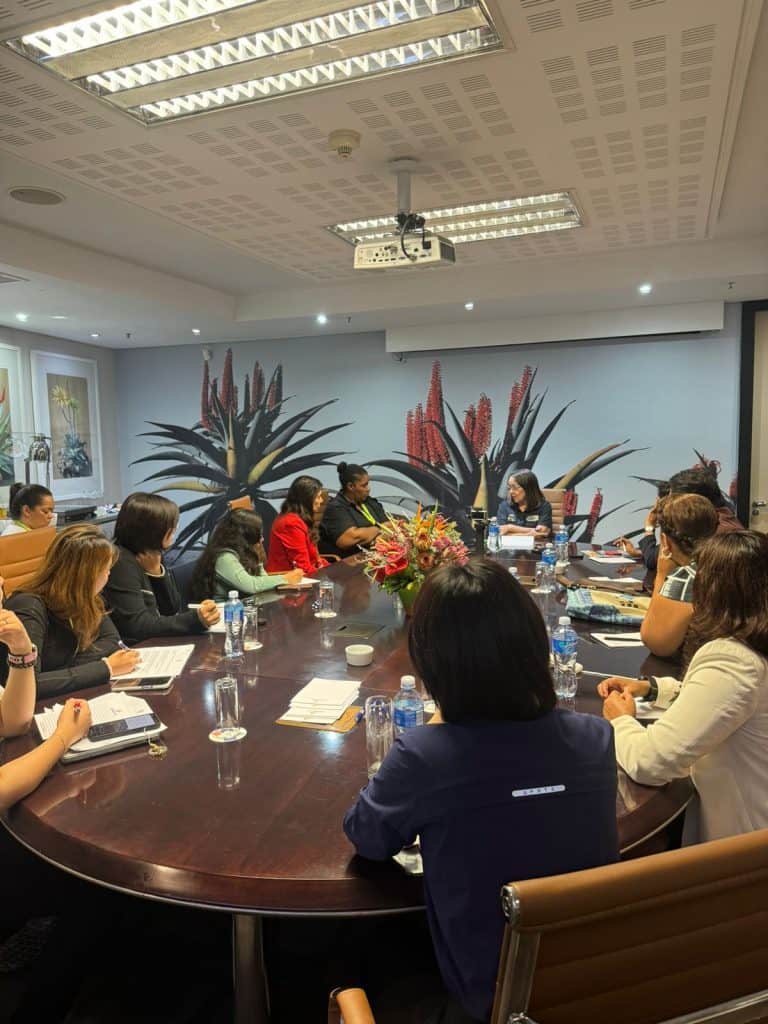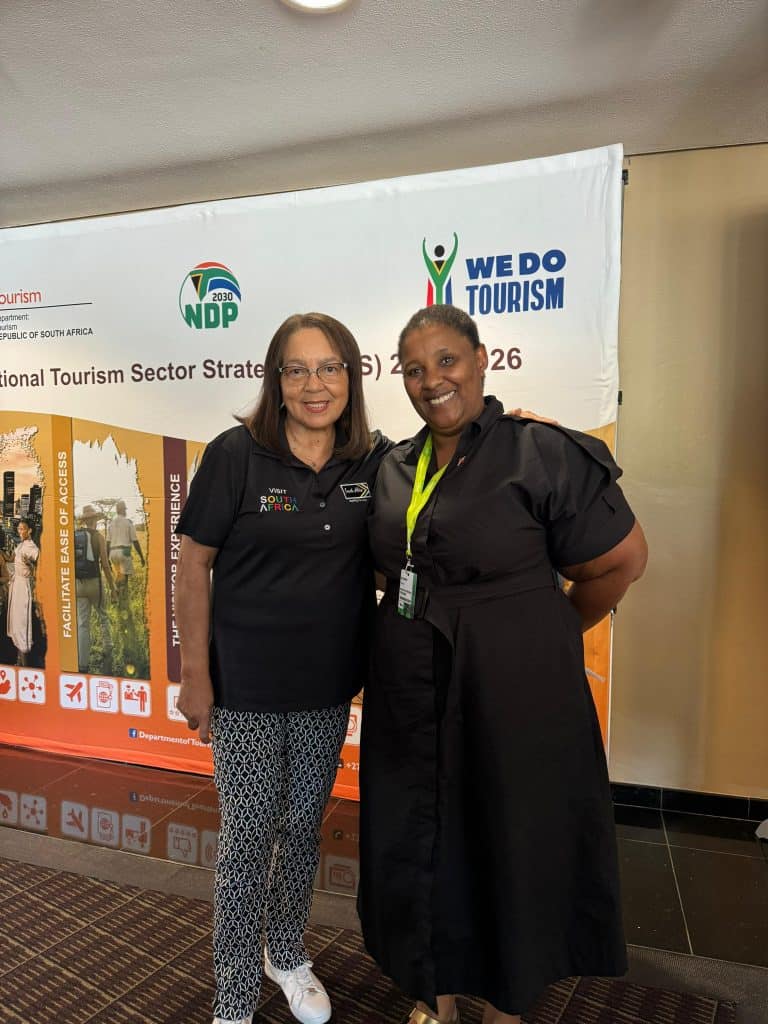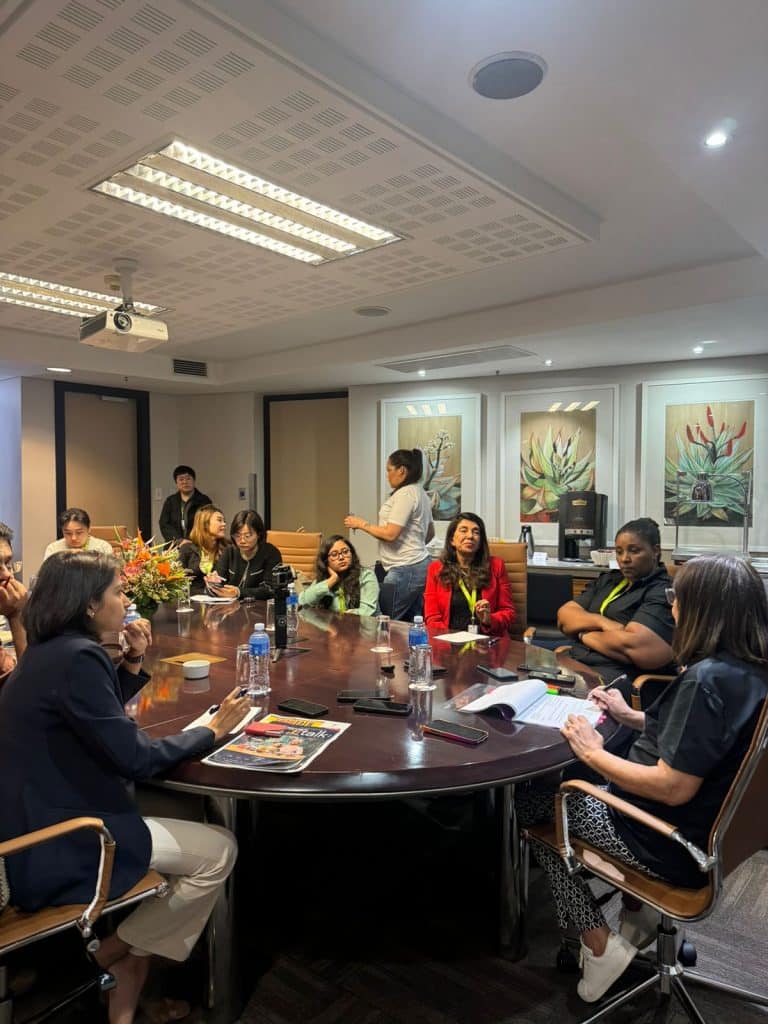South Africa Tourism Minister Patricia de Lille in an exclusive interview with Media in South Africa during Indaba discussed the E-visa system, alongside insights into strategic initiatives and collaborative efforts to attract more tourists from key markets such as India and China.

Tourism Minister Patricia de Lille addressed reporters with introductory remarks before opening the floor for questions. The Minister expressed gratitude to China and India for their continued support, highlighting the valuable insights gained from these key source markets.
Minister de Lille also sought feedback on preferred tourism establishments from representatives of China and India, emphasizing the importance of their input in enhancing South Africa’s tourism offerings. “Your help has been instrumental in putting together packages that your tourists can enjoy. Thank you very much for your support over many years,” she stated.
Addressing the topic of visa systems for India and China, Minister de Lille acknowledged that visas fall under the purview of the Minister of Home Affairs. However, the Minister revealed that efforts are underway to escalate a visa waiver of up to 90 days for both countries.
Minister de Lille stressed the significance of India and China as part of the BRICS countries, noting the visa waivers already in place for Russia and Brazil. “Russia and Brazil enjoy a visa waiver of up to 90 days within one calendar year, with an option for extension. We are advocating for the same provision for India and China, given their BRICS membership.”
Addressing significant issues with the E-visa systems for both China and India, Minister de Lille acknowledged the inefficiencies they have caused. “The E-visa system is not working sufficiently or efficiently, preventing people from applying for visas online from the comfort of their homes. I will discuss with the Department of Home Affairs what we are doing to improve this.”
Minister de Lille emphasized her proactive approach to resolving visa issues, stating, “People often post messages asking for help, and I then approach Home Affairs to address their concerns.” She reiterated the importance of open dialogue and assured the audience that further discussions would take place on this topic.
Recognizing the challenges faced by travellers, she revealed a new initiative within her office to expedite visa processes. “People sometimes have to leave their passports at our embassies for 25 to 27 days. To mitigate this, I have set up a facility within the Department of Tourism to help expedite visa approvals. It’s working, and sometimes people even contact me directly on social media.”
Minister de Lille assured the media of a collaborative effort with the Minister of Home Affairs to address visa issues for Chinese and Indian travellers. “If there are visa problems, please come to me. Our interest is to welcome you to South Africa.”
She reiterated the collaborative approach needed to enhance South Africa’s tourism sector, particularly with valuable input from representatives of China and India. “Given that the mandate spans different ministries, I want to extend my gratitude for your ongoing support and invite your advice on areas where we can improve,” Minister de Lille said. “We are here to listen and learn from you.”
Minister de Lille shared her recent experiences in India, recounting her stay in Goa for the G20 meeting. “Goa is a beautiful city. We stayed at a hotel right on the beachfront, with a view of the water stretching as far as the eye can see. We also visited the historic district, which was equally stunning. Thank you for the warm welcome we received in India.”
Her comments underscored the collaborative efforts required to enhance air connectivity and improve the overall travel experience for visitors from India, ultimately strengthening the tourism ties between South Africa and its key source markets.

Addressing air access issues to attract more tourists to South Africa
The Tourism Minister addressed the lack of direct air connectivity between South Africa and India, emphasizing the multifaceted approach needed to resolve this issue.
Minister de Lille emphasized the necessity of increasing flight frequency, particularly from India. “We have engaged with South African Airways, but they have not fully recovered since COVID-19. They went into business rescue, and a private partner now holds a 51% share, which has allowed some routes to return. However, the Johannesburg to Mumbai route has not been reinstated.”
At the G20 meeting, there were discussions about engaging with Air India to address this gap. Minister de Lille acknowledged the regulatory hurdles involved, stating, “When it comes to an application to fly to South Africa, the regulations and compliance fall under the Department of Civil Aviation and Transport. I’ve been trying to get information on Air India’s application to fly to Johannesburg, but it seems to be stuck somewhere.”
The Minister highlighted the importance of considering investment opportunities to enhance commercial activities and tourism, which in turn would support airlines in filling business class seats. “We need to look at the investment side because airlines rely on commercial activities and tourism to fill their business class seats,” she said. She pointed out the economic benefits for both India and South Africa, along with the potential for increased tourism.
The Minister also noted the strong familial connections between the two nations. “Many South African families have ties to Indian families through marriage or other relations. This family connection is significant,” Minister de Lille remarked.
She pointed out the current reliance on Ethiopian Airlines and Kenya Airways for flights between Africa and India.
Minister de Lille shared impressive statistics from the first quarter of 2024, noting an 82% increase in tourists from China despite having only one direct flight from the country. She acknowledged other airlines, such as Cathay, that also contribute to bringing Chinese tourists to South Africa.
She also shared positive news about Air China, noting that the airline, which currently flies three times a week, plans to increase its frequency to daily flights. “We are working on increasing air access from India as well,” she added.
Additionally, South African Airways has recently launched a direct flight to Australia, another major source market and a strong competitor. Minister de Lille highlighted the importance of addressing air access issues to attract more tourists to South Africa.

India market and the importance of MICE activities
Minister de Lille observed a marked interest in South Africa as a prime location for incentive travel, particularly as Indian corporations increase their investment in such initiatives. “Organizing these events strategically engages influential figures and strengthens partnerships. Overall, South Africa welcomed 79,774 Indian travellers last year, marking a 43% year-on-year increase. Notably, 46% of overall travellers were motivated by business travel, with MICE alone attracting 21%, signifying its underlying potential,” she added.
She further emphasized the importance of the Meetings, Incentives, Conferences, and Exhibitions (MICE) sector, which could substantially increase flight occupancy if direct flights were available. “The MICE sector from India is very strong and could fill up flights if they were available. Currently, travellers endure long layovers in Dubai, which makes the journey arduous.”
Minister de Lille highlighted the extensive engagement with Corporate Think Tank roadshows, involving over 500 corporates across five cities. “This effort has created a buzz in Cape Town and opened new opportunities for incentive travel. We plan to focus on bringing more tourists to Durban and other regions like Mpumalanga, which now has an international airport.”
Looking ahead, South Africa plans to host corporates to showcase the country’s unseen and undiscovered attractions. “We expect 30% of these attendees to visit South Africa. Additionally, we aim to conduct a major showcase in the year, highlighting our offerings.”
The minister discussed the notable success of the corporate outreach initiative, which has evolved into a robust platform for exploring business and corporate event opportunities in South Africa. “India stands out as one of the largest contributors to the inbound incentive travel market in South Africa,” Minister de Lille noted. She highlighted the pivotal role of corporate initiatives in understanding and streamlining the corporate travel demands of Indian companies.
With India’s outbound tourism market recovering strongly post-pandemic, South African Tourism aims to maintain this momentum, emphasizing the strategic importance of India as a focus market for 2024 and beyond. “In 2019, we welcomed 95,000 Indian visitors, and we expect to exceed 100,000 tourists from India in 2024,” she stated.
To further propel this momentum, Minister de Lille shared detailed plans and initiatives aimed at strengthening tourism ties with India. The Minister highlighted a significant South African delegation visit in February. “For two weeks, we took a delegation of tour operating companies and small businesses from South Africa and visited six cities within India,” she said. This initiative aimed to foster connections and promote joint tourism between India and South Africa.
While the Minister couldn’t attend the trip due to parliamentary commitments, she emphasized the importance of such engagements. “We visited both Tier 1 cities like Mumbai, Delhi, and Bangalore, and Tier 2 cities through a comprehensive roadshow. This year, we introduced 42 products, with 40% being new to India and 30% representing youth, black, and female entrepreneurs. They’ve made significant inroads,” she noted.
The impact of these efforts is already evident. “From January to March 2024, we welcomed more than 16,000 arrivals from India,” Minister de Lille stated. This significant increase in tourist arrivals from India underscores the success of South Africa’s targeted promotional activities and strategic engagements.
Read more: Today’s Traveller Interviews



